Fleurs du Mal Magazine



Buiten konvooi
Laat koel van hoofd en kalm van hart
de nacht de nacht. Er kraakt niets zacht.
Vreemde liederen schuren in oren,
spannen weemoed over afvaart.
Altijd op zoek naar wat verdwijnen
gaat ben je met oude woorden. Ze
weerspiegelen gewiste schaduw.
Bedaar de golven, stil de stem. Maak
voort, stuurman. En zwijg maar over
golving. Zet geen spie tussen de uren.
Doe de avond leunen op het kompas.
Boots: laat oorlammen aanrukken!
Bert Bevers
fleursdumal.nl magazine
More in: Archive A-B, Bevers, Bert
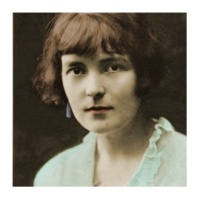 A Suburban Fairy Tale
A Suburban Fairy Tale
by Katherine Mansfield
Mr. and Mrs. B. sat at breakfast in the cosy red dining-room of their “snug little crib just under half-an-hour’s run from the City.”
There was a good fire in the grate—for the dining-room was the living-room as well—the two windows overlooking the cold empty garden patch were closed, and the air smelled agreeably of bacon and eggs, toast and coffee. Now that this rationing business was really over Mr. B. made a point of a thoroughly good tuck-in before facing the very real perils of the day. He didn’t mind who knew it—he was a true Englishman about his breakfast—he had to have it; he’d cave in without it, and if you told him that these Continental chaps could get through half the morning’s work he did on a roll and a cup of coffee—you simply didn’t know what you were talking about.
Mr. B. was a stout youngish man who hadn’t been able—worse luck—to chuck his job and join the Army; he’d tried for four years to get another chap to take his place but it was no go. He sat at the head of the table reading the Daily Mail. Mrs. B. was a youngish plump little body, rather like a pigeon. She sat opposite, preening herself behind the coffee set and keeping an eye of warning love on little B. who perched between them, swathed in a napkin and tapping the top of a soft-boiled egg.
Alas! Little B. was not at all the child that such parents had every right to expect. He was no fat little trot, no dumpling, no firm little pudding. He was under-sized for his age, with legs like macaroni, tiny claws, soft, soft hair that felt like mouse fur, and big wide-open eyes. For some strange reason everything in life seemed the wrong size for Little B.—too big and too violent. Everything knocked him over, took the wind out of his feeble sails and left him gasping and frightened. Mr. and Mrs. B. were quite powerless to prevent this; they could only pick him up after the mischief was done—and try to set him going again. And Mrs. B. loved him as only weak children are loved—and when Mr. B. thought what a marvellous little chap he was too—thought of the spunk of the little man, he—well he—by George—he …
“Why aren’t there two kinds of eggs?” said Little B. “Why aren’t there little eggs for children and big eggs like what this one is for grown-ups?”
“Scotch hares,” said Mr. B. “Fine Scotch hares for 5s. 3d. How about getting one, old girl?”
“It would be a nice change, wouldn’t it?” said Mrs. B. “Jugged.”
And they looked across at each other and there floated between them the Scotch hare in its rich gravy with stuffing balls and a white pot of red-currant jelly accompanying it.
“We might have had it for the week-end,” said Mrs. B. “But the butcher has promised me a nice little sirloin and it seems a pity”… Yes, it did and yet … Dear me, it was very difficult to decide. The hare would have been such a change—on the other hand, could you beat a really nice little sirloin?
“There’s hare soup, too,” said Mr. B. drumming his fingers on the table. “Best soup in the world!”
“O-Oh!” cried Little B. so suddenly and sharply that it gave them quite a start—“Look at the whole lot of sparrows flown on to our lawn”—he waved his spoon. “Look at them,” he cried. “Look!” And while he spoke, even though the windows were closed, they heard a loud shrill cheeping and chirping from the garden.
“Get on with your breakfast like a good boy, do,” said his mother, and his father said, “You stick to the egg, old man, and look sharp about it.”
“But look at them—look at them all hopping,” he cried. “They don’t keep still not for a minute. Do you think they’re hungry, father?”
Cheek-a-cheep-cheep-cheek! cried the sparrows.
“Best postpone it perhaps till next week,” said Mr. B., “and trust to luck they’re still to be had then.”
“Yes, perhaps that would be wiser,” said Mrs. B.
Mr. B. picked another plum out of his paper.
“Have you bought any of those controlled dates yet?”
“I managed to get two pounds yesterday,” said Mrs. B.
“Well a date pudding’s a good thing,” said Mr. B. And they looked across at each other and there floated between them a dark round pudding covered with creamy sauce. “It would be a nice change, wouldn’t it?” said Mrs. B.
Outside on the grey frozen grass the funny eager sparrows hopped and fluttered. They were never for a moment still. They cried, flapped their ungainly wings. Little B., his egg finished, got down, took his bread and marmalade to eat at the window.
“Do let us give them some crumbs,” he said. “Do open the window, father, and throw them something. Father, please!”
“Oh, don’t nag, child,” said Mrs. B., and his father said—“Can’t go opening windows, old man. You’d get your head bitten off.”
“But they’re hungry,” cried Little B., and the sparrows’ little voices were like ringing of little knives being sharpened. Cheek-a-cheep-cheep-cheek! they cried.
Little B. dropped his bread and marmalade inside the china flower pot in front of the window. He slipped behind the thick curtains to see better, and Mr. and Mrs. B. went on reading about what you could get now without coupons—no more ration books after May—a glut of cheese—a glut of it—whole cheeses revolved in the air between them like celestial bodies.
Suddenly as Little B. watched the sparrows on the grey frozen grass, they grew, they changed, still flapping and squeaking. They turned into tiny little boys, in brown coats, dancing, jigging outside, up and down outside the window squeaking, “Want something to eat, want something to eat!” Little B. held with both hands to the curtain. “Father,” he whispered, “Father! They’re not sparrows. They’re little boys. Listen, Father!” But Mr. and Mrs. B. would not hear. He tried again. “Mother,” he whispered. “Look at the little boys. They’re not sparrows, Mother!” But nobody noticed his nonsense.
“All this talk about famine,” cried Mr. B., “all a Fake, all a Blind.”
With white shining faces, their arms flapping in the big coats, the little boys danced. “Want something to eat—want something to eat.”
“Father,” muttered Little B. “Listen, Father! Mother, listen, please!”
“Really!” said Mrs. B. “The noise those birds are making! I’ve never heard such a thing.”
“Fetch me my shoes, old man,” said Mr. B.
Cheek-a-cheep-cheep-cheek! said the sparrows.
Now where had that child got to? “Come and finish your nice cocoa, my pet,” said Mrs. B.
Mr. B. lifted the heavy cloth and whispered, “Come on, Rover,” but no little dog was there.
“He’s behind the curtain,” said Mrs. B.
“He never went out of the room,” said Mr. B.
Mrs. B. went over to the window, and Mr. B. followed. And they looked out. There on the grey frozen grass, with a white white face, the little boy’s thin arms flapping like wings, in front of them all, the smallest, tiniest was Little B. Mr. and Mrs. B. heard his voice above all the voices, “Want something to eat, want something to eat.”
Somehow, somehow, they opened the window. “You shall! All of you. Come in at once. Old man! Little man!”
But it was too late. The little boys were changed into sparrows again, and away they flew—out of sight—out of call.
A Suburban Fairy Tale (1917)
by Katherine Mansfield (1888 – 1923)
From: Something Childish and Other Stories
fleursdumal.nl magazine
More in: Archive M-N, Katherine Mansfield, Mansfield, Katherine
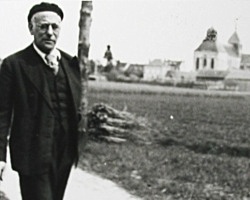
Max Jacob
(1876 – 1944)
Cimetière
Si mon marin vous le chassez
au cimetière vous le mettrez,
rose blanche,
rose blanche et rose rouge.
Ma tombe, elle est comme un jardin,
comme un jardin rouge et blanche,
Le dimanche vous irez,
rose blanche,
vous irez vous promener,
rose blanche et blanc muguet,
Tante
Yvonne à la
Toussaint
une couronne en fer peint
elle apporte de son jardin
en fer peint avec des perles de satin,
rose rouge et blanc muguet.
Si
Dieu veut me ressusciter
au
Paradis je monterai,
rose blanche,
avec un nimbe doré,
rose blanche et blanc muguet.
Si mon marin revenait,
rose rouge et rose blanche,
sur ma tombe il vient auprès,
rose blanche et blanc muguet.
Souviens-toi de notre enfance,
rose blanche,
quand nous jouions sur le quai,
rose blanche et blanc muguet.
Max Jacob poetry
fleursdumal.nl magazine
More in: Archive I-J, Jacob, Max
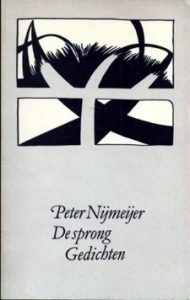 De dichter, vertaler en journalist Peter Nijmeijer (1947-2016), is op 9 september op 69-jarige leeftijd overleden.
De dichter, vertaler en journalist Peter Nijmeijer (1947-2016), is op 9 september op 69-jarige leeftijd overleden.
De Volkskrant berichtte deze week dat Nijmeijer in ‘volstrekte eenzaamheid’ is gestorven en dat het bericht van zijn dood, zelfs zijn naaste familieleden pas een maand later heeft bereikt. Hij was in de jaren zeventig poëzierecensent van deze krant.
Peter Nijmeijer was een zeer gewaardeerd vertaler van dichters als Seamus Heaney, Ted Hughes en Wallace Stevens. Titels van zijn eigen dichtbundels zijn o.a. De sprong, De afstand tot, De lippen van Max Ernst, Francesco’s Paradox en Barrage.
In Memoriam Peter Nijmeijer (1947-2016)
fleursdumal.nl magazine
More in: Archive M-N, Art & Literature News, In Memoriam

William Shakespeare
(1564-1616)
Good name in man and woman
Good name in man and woman, dear my lord,
Is the immediate jewel of their souls:
Who steals my purse steals trash; ’tis something, nothing;
‘Twas mine, ’tis his, and has been slave to thousands;
But he that filches from me my good name
Robs me of that which not enriches him
And makes me poor indeed.
William Shakespeare, “Othello”, Act 3 scene 3
Shakespeare 400 (1616 – 2016)
fleursdumal.nl magazine
More in: Archive S-T, Shakespeare, William

Adele Schopenhauer
(1797 – 1849)
An die Nacht
O stille Freundin Du! O wortlos ernste Nacht!
Nimm meinen lauten Schmerz in Deine Mutterarme!
Verhüll′ mein müdes Haupt in Deiner Schleier Pracht,
Daß dieses starre Herz in Thränenthau erwarme.
Zeig′ mir Ihn fern im Traum, erwecke heiß′res Sehnen –
Die harte Wirklichkeit nahm mir den Trost der Thränen.
Des Tages Forderung und seiner Fragen Qual,
Sie bleiben, fern gebannt, in weitem Kreise stehen –
Und frei von fremdem Zwang erhebt zum erstenmal
Die Seele sich empor, will weithin rückwärts sehen
Dorthin – wo sie geglaubt, dem Tod sich hinzugeben,
Und ach! so tief geirrt! sie gab sich hin – dem Leben!
Adele Schopenhauer Gedichte
fleursdumal.nl magazine
More in: Archive S-T, CLASSIC POETRY
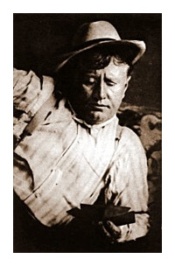 The Head-Hunter
The Head-Hunter
by O. Henry
When the war between Spain and George Dewey was over, I went to the Philippine Islands. There I remained as bush-whacker correspondent for my paper until its managing editor notified me that an eight-hundred-word cablegram describing the grief of a pet carabao over the death of an infant Moro was not considered by the office to be war news. So I resigned, and came home.
On board the trading-vessel that brought me back I pondered much upon the strange things I had sensed in the weird archipelago of the yellow-brown people. The manœuvres and skirmishings of the petty war interested me not: I was spell-bound by the outlandish and unreadable countenance of that race that had turned its expressionless gaze upon us out of an unguessable past.
Particularly during my stay in Mindanao had I been fascinated and attracted by that delightfully original tribe of heathen known as the head-hunters. Those grim, flinty, relentless little men, never seen, but chilling the warmest noonday by the subtle terror of their concealed presence, paralleling the trail of their prey through unmapped forests, across perilous mountain-tops, adown bottomless chasms, into uninhabitable jungles, always near with the invisible hand of death uplifted, betraying their pursuit only by such signs as a beast or a bird or a gliding serpent might make—a twig crackling in the awful sweat- soaked night, a drench of dew showering from the screening foliage of a giant tree, a whisper at even from the rushes of a water-level—a hint of death for every mile and every hour—they amused me greatly, those little fellows of one idea.
When you think of it, their method is beautifully and almost hilariously effective and simple.
You have your hut in which you live and carry out the destiny that was decreed for you. Spiked to the jamb of your bamboo doorway is a basket made of green withies, plaited. From time to time as vanity or ennui or love or jealousy or ambition may move you, you creep forth with your snickersnee and take up the silent trail. Back from it you come, triumphant, bearing the severed, gory head of your victim, which you deposit with pardonable pride in the basket at the side of your door. It may be the head of your enemy, your friend, or a stranger, according as competition, jealousy, or simple sportiveness has been your incentive to labour.
In any case, your reward is certain. The village men, in passing, stop to congratulate you, as your neighbour on weaker planes of life stops to admire and praise the begonias in your front yard. Your particular brown maid lingers, with fluttering bosom, casting soft tiger’s eyes at the evidence of your love for her. You chew betel-nut and listen, content, to the intermittent soft drip from the ends of the severed neck arteries. And you show your teeth and grunt like a water-buffalo—which is as near as you can come to laughing—at the thought that the cold, acephalous body of your door ornament is being spotted by wheeling vultures in the Mindanaoan wilds.
Truly, the life of the merry head-hunter captivated me. He had reduced art and philosophy to a simple code. To take your adversary’s head, to basket it at the portal of your castle, to see it lying there, a dead thing, with its cunning and stratagems and power gone—Is there a better way to foil his plots, to refute his arguments, to establish your superiority over his skill and wisdom?
The ship that brought me home was captained by an erratic Swede, who changed his course and deposited me, with genuine compassion, in a small town on the Pacific coast of one of the Central American republics, a few hundred miles south of the port to which he had engaged to convey me. But I was wearied of movement and exotic fancies; so I leaped contentedly upon the firm sands of the village of Mojada, telling myself I should be sure to find there the rest that I craved. After all, far better to linger there (I thought), lulled by the sedative plash of the waves and the rustling of palm-fronds, than to sit upon the horsehair sofa of my parental home in the East, and there, cast down by currant wine and cake, and scourged by fatuous relatives, drivel into the ears of gaping neighbours sad stories of the death of colonial governors.
When I first saw Chloe Greene she was standing, all in white, in the doorway of her father’s tile-roofed dobe house. She was polishing a silver cup with a cloth, and she looked like a pearl laid against black
O. Henry
(1862 – 1910)
The Head-Hunter
fleursdumal.nl magazine
More in: Archive G-H, Henry, O.
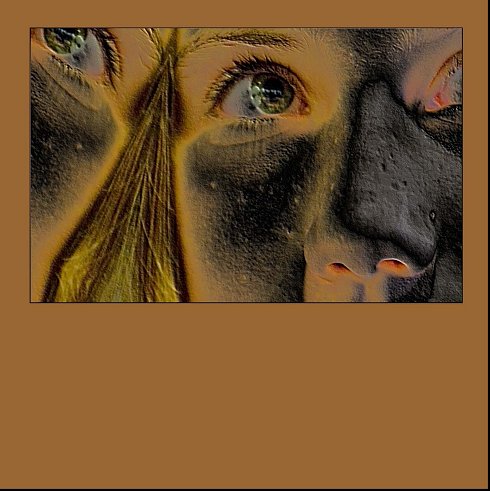
A case of identity:
Lolita
jef van kempen 2010
fleursdumal.nl magazine
More in: Jef van Kempen Photos & Drawings, Photography
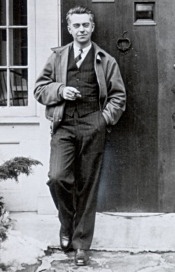
Hart Crane
(1889 – 1932)
At Melville’s Tomb
Often beneath the wave, wide from this ledge
The dice of drowned men’s bones he saw bequeath
An embassy. Their numbers as he watched,
Beat on the dusty shore and were obscured.
And wrecks passed without sound of bells,
The calyx of death’s bounty giving back
A scattered chapter, livid hieroglyph,
The portent wound in corridors of shells.
Then in the circuit calm of one vast coil,
Its lashings charmed and malice reconciled,
Frosted eyes there were that lifted altars;
And silent answers crept across the stars.
Compass, quadrant and sextant contrive
No farther tides . . . High in the azure steeps
Monody shall not wake the mariner.
This fabulous shadow only the sea keeps.
Hart Crane poetry
fleursdumal.nl magazine
More in: Archive C-D, Crane, Hart, Herman Melville
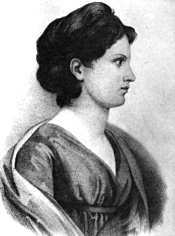
Karoline von Günderrode
(1780 – 1806)
Liebe
O reiche Armuth! Gebend, seliges Empfangen!
In Zagheit Muth! in Freiheit doch gefangen.
In Stummheit Sprache,
Schüchtern bei Tage
Siegend mit zaghaftem Bangen.
Lebendiger Tod, im Einen sel’ges Leben
Schwelgend in Noth, im Widerstand ergeben,
Genießend schmachtend,
Nie satt betrachten
Leben im Traum und doppelt Leben.
Karoline Günderrode Gedichte
fleursdumal.nl magazine
More in: Archive G-H, Karoline von Günderrode
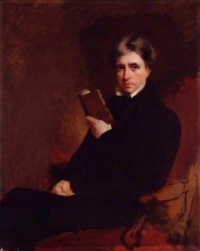
Leigh Hunt
(1784 – 1859)
Ariadne Waking
The moist and quiet morn was scarcely breaking,
When Ariadne in her bower was waking;
Her eyelids still were closing, and she heard
But indistinctly yet a little bird,
That in the leaves o’erhead, waiting the sun,
Seemed answering another distant one.
She waked, but stirred not, only just to please
Her pillow-nestling cheek; while the full seas,
The birds, the leaves, the lulling love o’ernight
The happy thought of the returning light,
The sweet, self-willed content, conspired to keep
Her senses lingering in the feel of sleep;
And with a little smile she seemed to say,
“I know my love is near me, and ’tis day.”
Leigh Hunt poetry
fleursdumal.nl magazine
More in: Archive G-H, Hunt, Leigh
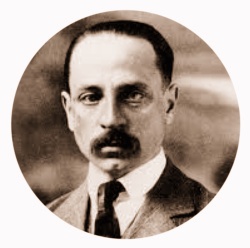
Rainer Maria Rilke
(1875 – 1926)
Der Gefangene
I
Meine Hand hat nur noch eine
Gebärde, mit der sie verscheucht;
auf die alten Steine
fällt es aus Felsen feucht.
Ich höre nur dieses Klopfen
und mein Herz hält Schritt
mit dem Gehen der Tropfen
und vergeht damit.
Tropften sie doch schneller,
käme doch wieder ein Tier.
Irgendwo war es heller -.
Aber was wissen wir.
II
Denk dir, das was jetzt Himmel ist und Wind,
Luft deinem Mund und deinem Auge Helle,
das würde Stein bis um die kleine Stelle
an der dein Herz und deine Hände sind.
Und was jetzt in dir morgen heißt und: dann
und: späterhin und nächstes Jahr und weiter –
das würde wund in dir und voller Eiter
und schwäre nur und bräche nicht mehr an.
Und das was war, das wäre irre und
raste in dir herum, den lieben Mund
der niemals lachte, schäumend von Gelächter.
Und das was Gott war, wäre nur dein Wächter
und stopfte boshaft in das letzte Loch
ein schmutziges Auge. Und du lebtest doch.
Rainer Maria Rilke Gedichte
fleursdumal.nl magazine
More in: Archive Q-R, Rilke, Rainer Maria
Thank you for reading Fleurs du Mal - magazine for art & literature